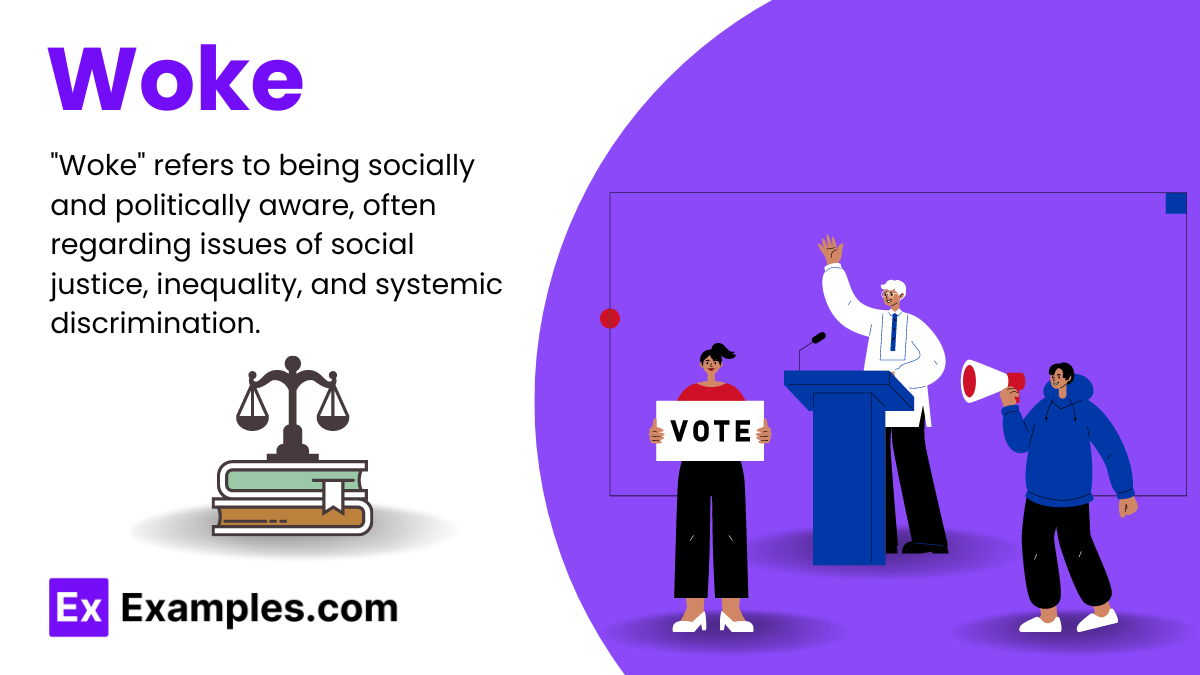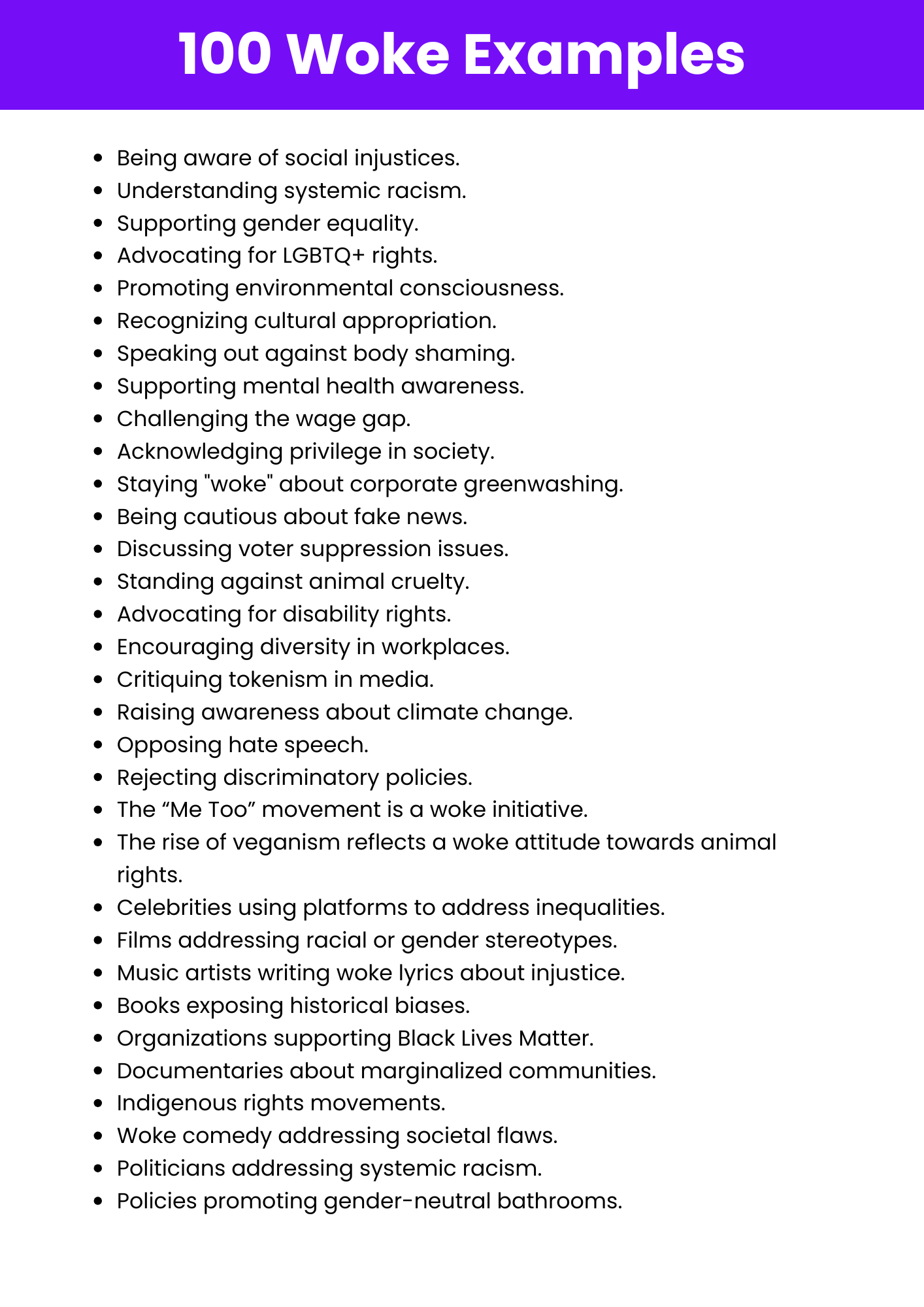Woke
What is Woke? – Definition
Woke is a term used to describe a heightened awareness of social injustices and inequalities. It’s not just a buzzword but a call to action to recognize and address systemic issues in society.

Generated Woke Examples

Examples of Wokes
- Being woke means actively challenging injustices.
- Woke individuals advocate for equality and inclusion.
- Teaching students to be woke fosters a just society.
- Public figures who are woke use their platforms responsibly.
- Creating accessible environments is a sign of being woke.
- Innovative solutions often come from woke perspectives.
- Woke communities support each other in meaningful ways.
- Celebrating diverse achievements is a woke practice.
- Promoting environmental sustainability is part of being woke.
- Providing support to marginalized groups reflects a woke attitude.
- A woke mindset embraces continuous learning and growth.
- Empathy towards others is a key aspect of being woke.
- Authentic actions demonstrate a genuinely woke character.
- Rejecting harmful stereotypes is essential for being woke.
- Collaborating with diverse groups showcases a woke approach.
- Advocating for equitable transportation reflects a woke perspective.
- Supporting fair labor practices is a woke initiative.
- Cultivating positive relationships is part of a woke lifestyle.
- Celebrating cultural diversity embodies a woke ethos.
- Promoting love and acceptance is a fundamental woke value.
- Taking responsibility for one’s actions is a woke practice.
- Supporting public transportation initiatives is part of being woke.
- Advocating for environmental justice signifies a woke stance.
- Ensuring healthcare accessibility is a woke priority.
- Community volunteering embodies the spirit of being woke.
- Challenging discriminatory practices is a woke endeavor.
- Building inclusive communities is central to being woke.
- Repairing systemic inequalities reflects a woke mission.
- Providing support to underrepresented groups is a woke action.
- Personal growth towards empathy is part of being woke.
Types of Wokes
Social Justice Woke
Awareness and advocacy for social justice issues, including racial, gender, and LGBTQ+ equality.
- Supporting Black Lives Matter movements.
- Advocating for LGBTQ+ marriage rights.
- Protesting against police brutality.
- Promoting women’s rights and equality.
- Campaigning for disability inclusivity.
Political Woke
Awareness and critique of political systems and policies impacting equality and fairness.
- Advocating for voter registration drives.
- Critiquing unfair immigration laws.
- Supporting climate action policies.
- Demanding justice reforms in court systems.
- Protesting gerrymandering in elections.
Performative Woke
Adopting woke language or actions without genuine commitment to the cause.
- Posting “Blackout Tuesday” without donating or acting.
- Using LGBTQ+ slogans for marketing but lacking inclusivity policies.
- Publishing diversity statements without action.
- Brands supporting causes only during trendy moments.
- Individuals using hashtags without understanding movements.
Economic Woke
Awareness of economic disparities and advocacy for financial equality.
- Supporting living wage campaigns.
- Fighting for student loan forgiveness.
- Demanding tax reforms for the wealthy.
- Campaigning against predatory lending practices.
- Supporting equal pay legislation.
Cultural Woke
Awareness of cultural appropriation, representation, and respect for diverse traditions and practices.
- Promoting authentic representation in films and media.
- Avoiding the use of sacred symbols as fashion trends.
- Respecting indigenous lands and rights.
- Celebrating and learning about diverse traditions respectfully.
- Encouraging multiethnic collaborations in art and education.
Spiritual Woke
Awareness of self, mindfulness, and connection to the universe or inner consciousness.
- Practicing meditation for mental clarity.
- Exploring mindfulness to reduce stress.
- Engaging in yoga to harmonize body and mind.
- Connecting with nature for spiritual growth.
- Practicing gratitude to foster inner peace.
Environmental Woke
Awareness of environmental issues and advocacy for sustainable practices.
- Supporting renewable energy solutions.
- Participating in reforestation projects.
- Advocating for plastic waste reduction.
- Educating on the impact of fast fashion.
- Promoting zero-waste living practices.
Backlash Woke
Criticism or rejection of woke culture, often seen as excessive or performative.
- Critiquing cancel culture as overreach.
- Mocking corporations for performative allyship.
- Opposing diversity quotas as forced inclusion.
- Satirizing woke language as overly sensitive.
- Calling out “wokeness” as a distraction from real issues.
How to Identify/Find Woke?
To identify wokes, look for actions and statements that demonstrate a commitment to social justice and equality. Wokes often address systemic issues, promote inclusivity, and advocate for marginalized communities.
- Look for clear evidence of advocating for change and equality.
- Identify initiatives that promote inclusivity and diversity.
- Check if the actions aim to address and dismantle systemic injustices.
- Notice if there is an emphasis on supporting marginalized communities.
- Look for comprehensive approaches that integrate various aspects of social justice.
How to Use Woke?
Incorporate woke principles into your daily life by promoting fairness, advocating for equality, and challenging discriminatory practices. Ensure your actions are meaningful and contribute to positive social change.
- Promote inclusive language and practices in your environment.
- Use your platform to raise awareness about social injustices.
- Support policies and initiatives that aim to reduce inequality.
- Educate yourself and others about the history and impact of systemic issues.
- Continuously evaluate and improve your efforts to ensure they are effective and genuine.
Other Homophone Examples
Woke Examples in Daily Life
Instances of “woke” awareness and action integrated into everyday routines.
- Recycling household waste regularly.
- Using reusable shopping bags to reduce plastic usage.
- Buying fair-trade coffee to support ethical sourcing.
- Using public transport to reduce carbon emissions.
- Avoiding fast fashion and opting for sustainable clothing.
Woke Examples for Kids
Simple and relatable actions to teach children about awareness and responsibility.
- Turning off lights to save energy.
- Using a water bottle instead of single-use plastics.
- Helping plant a tree in the garden.
- Donating old toys to kids in need.
- Learning about different cultures in school.
Woke Examples for Students
Actions and behaviors that encourage awareness and activism among students.
- Joining a school climate action group.
- Participating in anti-bullying campaigns.
- Volunteering at a local food bank.
- Advocating for gender-neutral bathrooms at school.
- Supporting fair-trade products for school projects.
Woke Examples in Movies
Instances in movies where social awareness, representation, and activism are highlighted.
- “Black Panther” showcasing African culture and empowerment.
- “Hidden Figures” highlighting African-American women in NASA.
- “The Hate U Give” addressing racial injustice.
- “Captain Marvel” promoting female empowerment.
- “Wall-E” addressing environmental degradation.
Examples of Woke Capitalism
Corporations engaging in socially aware campaigns or initiatives, often for branding purposes.
- Nike’s “Dream Crazy” campaign featuring Colin Kaepernick.
- Gillette’s ad tackling toxic masculinity.
- Ben & Jerry’s support for climate action.
- Starbucks committing to racial bias training.
- Patagonia’s focus on sustainable outdoor clothing.
Examples of Woke Culture
Cultural shifts emphasizing awareness, inclusivity, and social justice in practices and conversations.
- Adding pronouns to email signatures.
- Celebrating Indigenous People’s Day instead of Columbus Day.
- Promoting vegan options in corporate cafeterias.
- Highlighting diverse authors in reading curriculums.
- Encouraging gender-neutral clothing lines in fashion.
Examples of Woke Language
Adopting inclusive and socially aware language to foster equity and respect.
- Using “partner” instead of “husband” or “wife.”
- Saying “person with a disability” instead of “disabled person.”
- Referring to “historically excluded groups” instead of “minorities.”
- Replacing “man-made” with “human-made.”
- Using “parental leave” instead of “maternity leave.”
Examples of Woke Behavior
Actions and attitudes reflecting awareness and advocacy for equality and justice.
- Standing up against workplace discrimination.
- Calling out racist or sexist jokes.
- Donating to organizations fighting inequality.
- Supporting marginalized colleagues in meetings.
- Speaking out for environmental sustainability at work.
Explore Other Literary Devices
Elevate Your AP English Preparation
Unlock your potential with our comprehensive AP English exam preparation tools designed to help you excel.
- Extensive Question Bank: Access 900+ exam-like questions for both AP English Language and Literature.
- Expertly Crafted: Questions mirror the structure and difficulty of actual AP exams, ensuring relevant practice.
- Detailed Explanations: Understand your mistakes with clear, concise breakdowns of correct and incorrect answers.
- Personalized Learning: Tailor your study sessions with topic-specific tests and adaptive learning tools.
- Comprehensive Coverage: Master all aspects of the AP English curriculum with extensive guides and resources.
Frequently Asked Questions
-
What is woke?
Woke is a term that signifies an awareness and active pursuit of social justice and equality. It involves recognizing and addressing systemic issues that lead to discrimination and inequality. -
How does woke differ from being socially conscious?
While both involve awareness of social issues, being woke emphasizes active engagement and advocacy for change, whereas being socially conscious may simply involve awareness without direct action. -
Why is being woke important in today’s society?
Being woke is crucial for promoting equality, combating injustice, and fostering inclusive communities. It encourages individuals and organizations to take responsibility for creating positive social change. -
Can anyone adopt a woke mindset?
Yes, anyone can cultivate a woke mindset by educating themselves about social issues, being open to different perspectives, and actively participating in efforts to promote justice and equality. -
How can I effectively practice being woke?
To effectively practice being woke, engage in continuous learning, support marginalized communities, advocate for equitable policies, and reflect on your own biases to ensure your actions contribute to meaningful social change.

